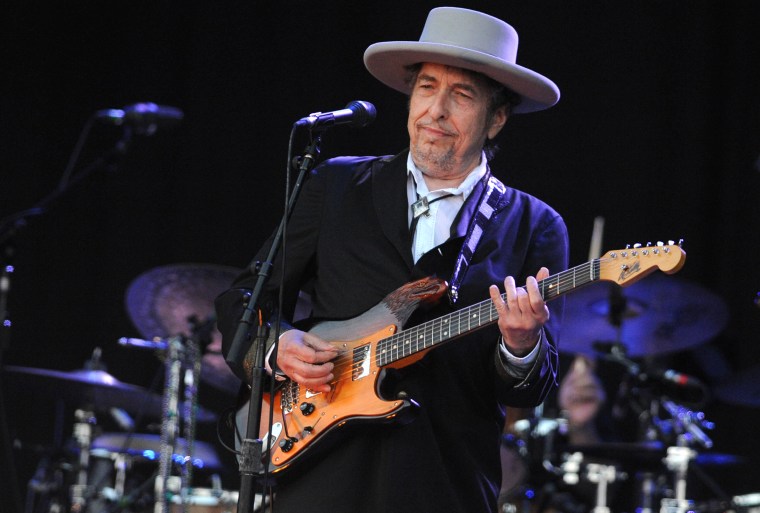Last night, while a restless world on the verge of collapse slept, Bob Dylan released a nearly 17-minute song about — wait for it — the assassination of President John F. Kennedy.
With a title straight out of Shakespeare, “Murder Most Foul,” and in the tried and true Dylan style, the legendary singer mixes past and present, narrator and subject, in an apocalyptic stew that only an artist like Dylan — our very own modern Bard — would have the audacity to release, just as other artists are postponing imminent album premieres and tours.
Of course, like all things Dylan, “Murder Most Foul” isn’t for everyone. It’s length alone will be off-putting to all but the most diehard Dylanologist.
Of course, like all things Dylan, “Murder Most Foul” isn’t for everyone. It’s length alone will be off-putting to all but the most diehard Dylanologist. It’s also virtually devoid of melody, and unlike anything Dylan has ever released, with Dylan essentially delivering his spoken-word, stream of consciousness lyrics on top of a sparse accompaniment of piano, violin and light percussion.
“I get it that a song this long isn’t going to be a top priority for most people, especially my age, because it’s almost ‘The Irishman’ of songs,” says musician Trapper Schoepp, who collaborated with Dylan last year on the song “On, Wisconsin” which completed an unfinished lyric of the legend’s from 1961. “But this song didn’t feel long to me. And what’s so mind-blowing about it, and what makes it so powerful, is precisely that it doesn’t conform to the normal pop song structure, and yet it still holds your interest all the way through.”
While Dylan references Kennedy’s assassination — as well as some of the conspiracies surrounding it — in vivid and gripping detail, “Murder Most Foul” also contains a litany of pop culture references, at once disjointed, but also clearly stated. It’s all part of a puzzle Dylan seems to be daring listeners to try to piece together.
Along the way, he references everyone from The Beatles to Gerry and the Pacemakers, Woodstock and the Rolling Stones’ concert at Altamont Speedway, Nat King Cole, Charlie Parker and a laundry list of jazz greats, as well as Dickey Betts of the Allman Brothers Band, 70s soft-rockers, and the Everly Brothers — or perhaps that’s his early-60s girlfriend Suze Rotolo — Wolfman Jack, and just about every other pre-millennial cultural reference you can think of.
“This is music about music,” posits Schoepp, himself a millennial. “For Dylan’s generation, JFK’s assassination shook their world. For my generation the coronavirus and the Trump presidency will be a defining moment. So while those things are wildly different, I think Dylan’s reminder of JFK’s assassination within these modern times is what makes the song so piercing and poetic and powerful. The release that music offers within that context, I think, is why Dylan offers up all the popular culture escapes. That’s very relevant to what we’re going through right now.”
Of course, the real audience is Dylan’s legion of diehard fans, who have grown only more in thrall of his work in the last decade. Stuck inside as the result of the coronavirus pandemic, with a median age hovering in “Ok, boomer” territory, armchair Dylanologists will have a lot to pore over while they look for new ways to pass the time.
Of course, the real audience is Dylan’s legion of diehard fans, who have grown only more in thrall of his work in the last decade.
Already, the exhaustive fan site Expecting Rain — an essential part of every serious Dylan fan’s daily routine — has transcribed the lyrics, and is busy compiling every article both reporting on and seeking to discern the meaning of Dylan’s latest release from around the globe.
Our attention spans are dwindling, thanks in large part to the way we listen to music and watch movies. As Schoepp notes, we hate sitting through the few seconds of pre-roll ads that precede YouTube videos.
“But if you understand history and the context in which this song is being released and the artist it’s coming from, you’ll recognize that it’s both pure Dylan while also being something that he’s never done before,” says Schoepp. “A commentary on a major cultural event that’s happening now by referencing a major cultural event of the past.”
In the end, I’m reminded of an oft-told anecdote about Dylan’s now second-longest song, the 16-minute “Highlands,” from 1997s “Time Out Of Mind.” During a pre-release playback, a label executive asked Dylan, “Is there a short version?” Dylan, without missing a beat, replied, “That was the short version.”
So Bob Dylan has a lot to say about JFK, our collective fascination with the famous and infamous and, more than likely, the coronavirus. While it may not be your cup of tea, there are worse things to contemplate while you’re stuck at home than what “Murder Most Foul” is all about.


